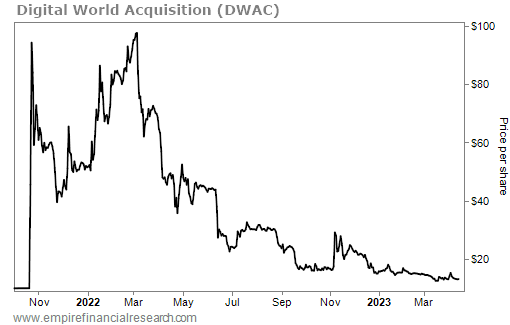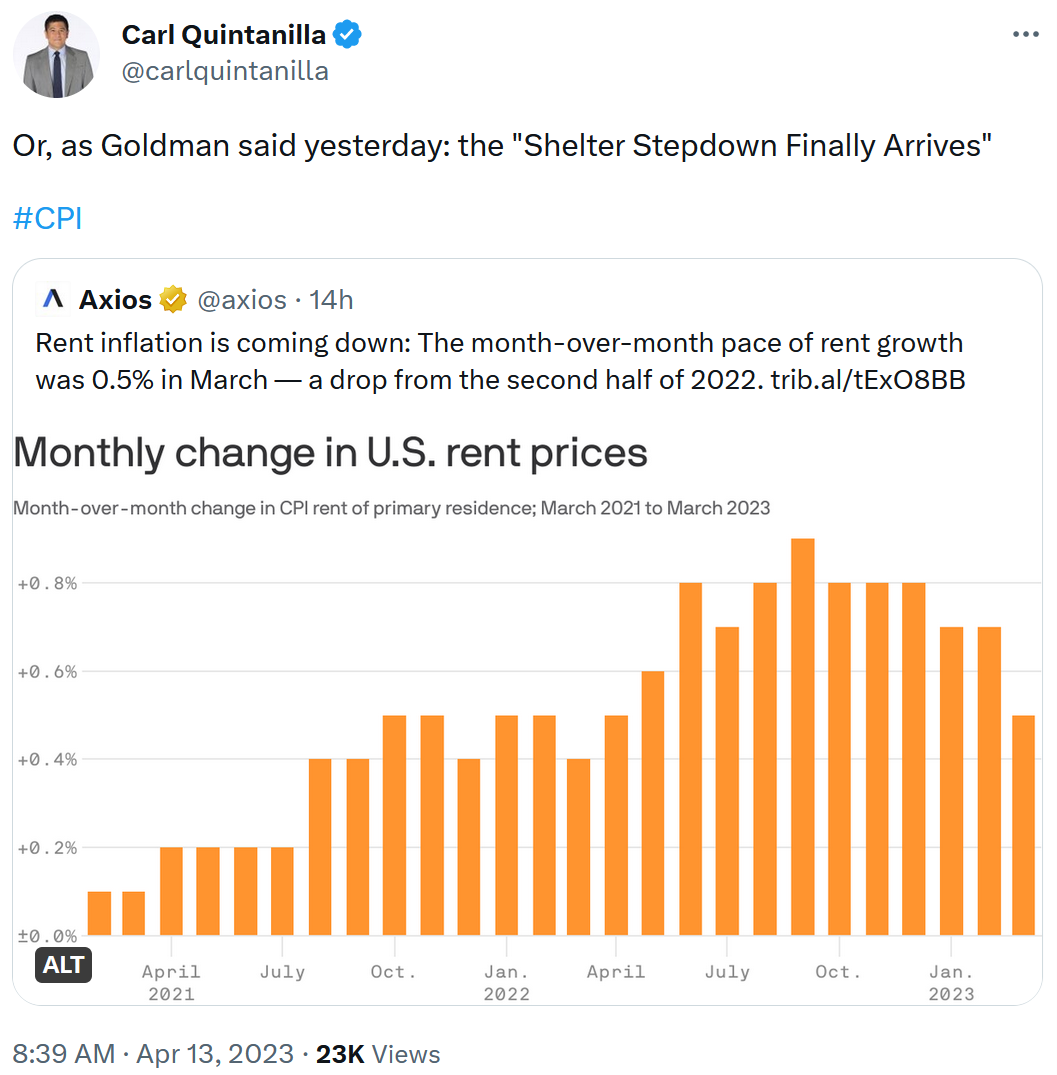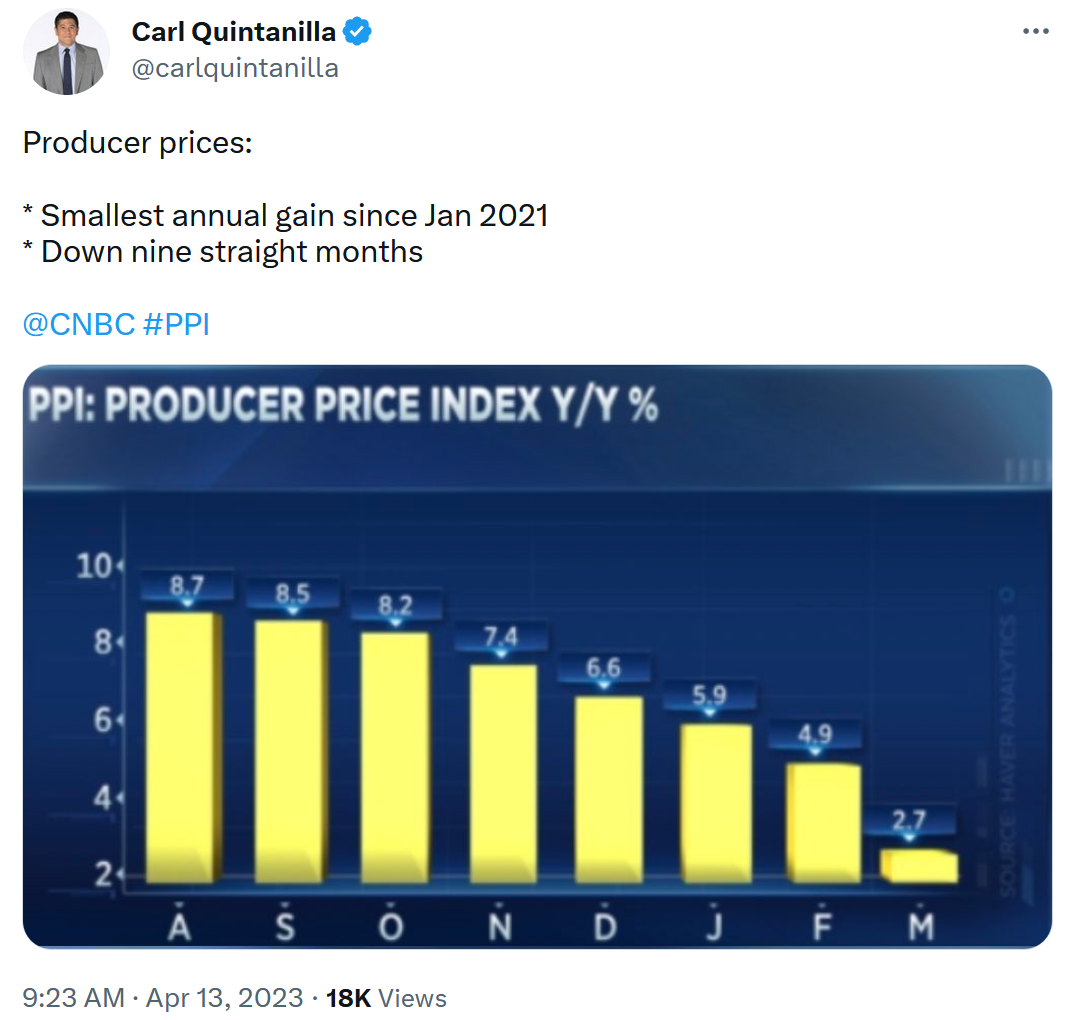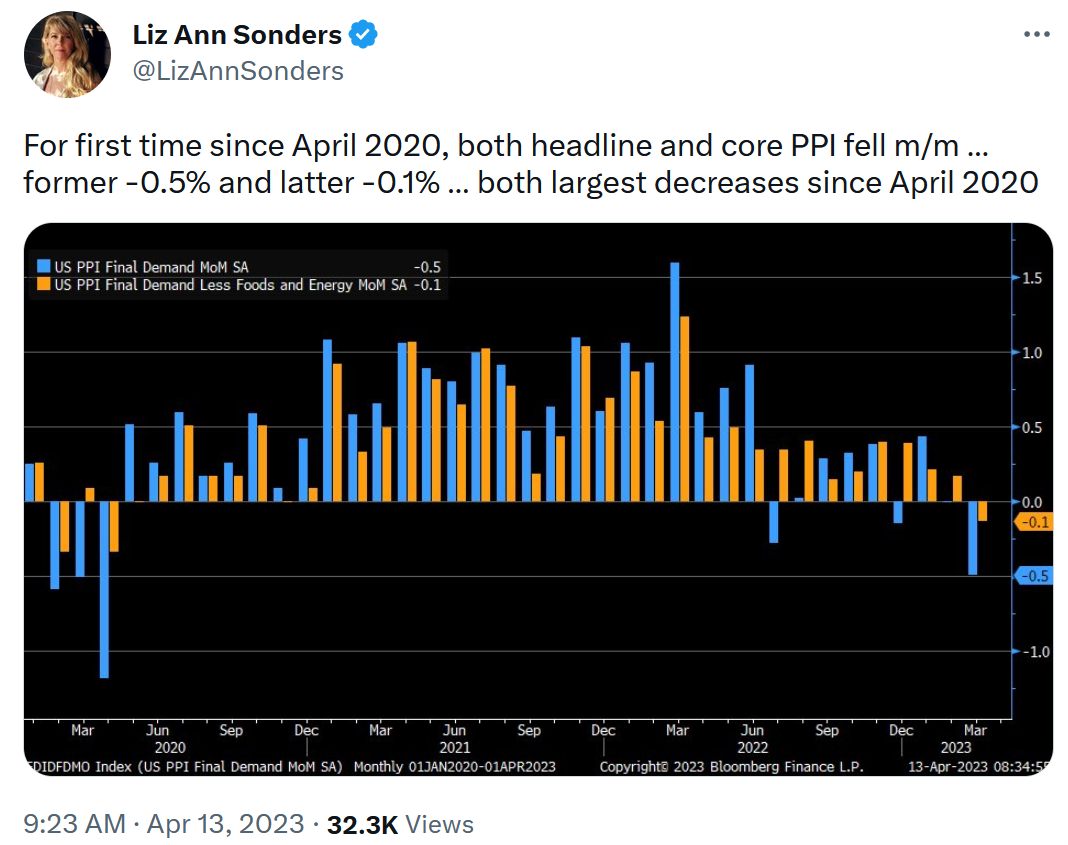Removing DWAC from the 'Dirty Dozen'; Three tweets related to Wednesday's inflation report; Moderate Drinking Has No Health Benefits, Analysis of Decades of Research Finds; More on alcohol abuse
1) In my March 23 e-mail, I removed GameStop (GME) from my "Dirty Dozen" list of stocks to avoid.
Today, it's time to remove another: Digital World Acquisition (DWAC), the SPAC that signed a deal to acquire Trump Media and Technology Group ("TMTG"), which owns Twitter copycat Truth Social.
I first warned my readers about it 18 months ago on October 22, 2021, when the stock hit a high of $175 per share, writing: "This is one of the stupidest things I've ever seen and this stock is going to implode, likely within days."
Sure enough, the stock peaked that day, had been cut in half within two days, and has continued sinking toward DWAC's cash value of $10 per share ever since (with a few brief dead-cat bounces), as you can see in this chart:
I continued to warn my readers about this stock – which I thought, and still think, is a toxic piece of garbage – in dozens of e-mails since then (archive here).
So if you've been clever enough to short the stock, why do I suggest covering now?
Simply put: price.
The stock closed yesterday at $13.14 per share, only slightly above DWAC's cash. Given that I think there's almost no chance the deal to acquire TMTG goes through and it's likely too late to find another deal, DWAC is almost certain to liquidate and return $10 per share to shareholders.
In this case, anyone who's short the stock at today's price will pocket a gain of $3 per share, so why not stick around?
Because "almost certain" isn't the same as "100% certain" – and, as we've seen, this stock can trade almost anywhere, totally disconnected from its fundamentals.
I'm wary of picking up pennies in front of a steamroller, which I discussed at length in my January 20 e-mail.
No matter how likely the outcome, it doesn't make sense to risk losing tens of dollars (and possibly more than $100) per share to make $3...
2) Here are three tweets related to Wednesday's inflation report...
The cost of shelter – the price of housing and renting – accounts for a full third of the inflation number and, the way it's calculated, tends to lag what's actually happening in the market, so it's been causing inflation to be overstated. That said, it's now coming down as well, as this tweet by CNBC's Carl Quintanilla shows:
Quintanilla also tweeted another chart showing how producer prices are falling quickly:
Lastly, Liz Ann Sonders tweeted this:
In summary, I continue to believe that inflation is under control and will continue to decline, which increases the chances that the Fed soon stops raising interest rates and, by the end of the year, starts cutting them – which would likely be good news for stocks.
3) In high school I worked for two summers as a lifeguard and general handyman at an alcoholic rehabilitation hospital. I've also seen up close among a handful of friends and extended family members the devastation that excessive alcohol consumption can cause, so it's a topic I follow closely...
I've always been skeptical of the reports that there are no dangers – and possibly even benefits – to moderate drinking and, sure enough, this myth has been dispelled by recent research, as summarized in this recent New York Times article: Moderate Drinking Has No Health Benefits, Analysis of Decades of Research Finds. Excerpt:
For decades, scientific studies suggested moderate drinking was better for most people's health than not drinking at all, and could even help them live longer.
A new analysis of more than 40 years of research has concluded that many of those studies were flawed and that the opposite is true.
The review found that the risks of dying prematurely increase significantly for women once they drink 25 grams of alcohol a day, which is less than two standard cocktails containing 1.5 ounces of distilled spirits, two 12-ounce beers or two 5-ounce glasses of wine. The risks to men increase significantly at 45 grams of alcohol a day, or just over three drinks.
The new report, which analyzed more than 100 studies of almost five million adults, was not designed to develop drinking recommendations, but to correct for methodological problems that plagued many of the older observational studies. Those reports consistently found that moderate drinkers were less likely to die of all causes, including those not related to alcohol consumption.
Most of those studies were observational, meaning they could identify links or associations but they could be misleading and did not prove cause and effect. Scientists said that the older studies failed to recognize that light and moderate drinkers had myriad other healthy habits and advantages, and that the abstainers used as a comparison group often included former drinkers who had given up alcohol after developing health problems.
These four articles caught my eye about the perils of alcohol and drunkenness...
- How I let drinking take over my life
- How cutting back on alcohol can help depression and anxiety
- ABC News Producer Choked to Death on Drunken Night Out With Wife
- Man urinating onto Manhattan subway tracks falls off platform, fatally struck by train
Lastly, here's an excerpt from my book, The Art of Playing Defense, on this topic:
Alcohol Abuse
When I order a Diet Coke while others are drinking wine or having a beer, I'm sometimes asked whether I drink.
"Only to excess," I reply with a smile.
I'm only half-kidding. For whatever reason, I've never developed a taste for alcohol. Beer—yuck! I've had one in my life. To me, wine tastes like vinegar and hard alcohol like kerosene.
I do like mixed drinks like daiquiris or piña coladas, but that's only because the fruity flavors mask the taste of the alcohol.
In addition to the bad taste, alcohol is expensive and unhealthy.
For all of these reasons, I rarely drink.
But every few years, when I'm at a great party with friends, I'll drink a lot.
I've been really drunk fewer than a dozen times in my life. And, surprisingly, given how rarely I drink, I have only positive memories of these nights.
So I don't have a problem with anyone drinking—even occasionally to excess, as long as it's done safely.
But it's really important not to become a problem drinker or, worse yet, an alcoholic. Few things will destroy your life more thoroughly—it can even kill you. Over 72,000 Americans died from alcohol-related causes in 2017, up more than 100% in the past two decades and accounting for 2.6 percent of all deaths.
At a young age, I saw up close what alcoholism can do when I worked as a lifeguard for two summers at an alcoholic rehabilitation hospital in New Hampshire. Most of the "drunks," as they laughingly called themselves, had hit rock bottom, losing their jobs, marriages, etc.
Numerous studies support this anecdote. In the Harvard Study of Adult Development cited earlier, alcohol abuse was one of the major risk factors. Psychiatrist George Vaillant, who joined the team as a researcher in 1966 and led the study from 1972 until 2004, wrote that six factors predicted healthy aging for the Harvard men: physical activity, absence of alcohol abuse and smoking, having mature mechanisms to cope with life's ups and downs, a healthy weight, and a stable marriage.
In particular, he noted that "alcoholism and major depression could take people who started life as stars and leave them at the end of their lives as train wrecks." Alcoholism was the main cause of divorce among men in the study and was strongly correlated with neurosis and depression, which tended to follow alcohol abuse rather than precede it. Together with associated cigarette smoking, it was the single greatest contributor to early morbidity and death.
Even if you're not a problem drinker, much less an alcoholic, you must be careful about getting drunk because it can lead to disaster.
Let me tell you about a young guy I met years ago named Genarlow Wilson. Raised by a single mom, he grew up poor outside Atlanta. Despite attending a number of tough schools, he was doing well in high school: he was an honor student, the star of the football team, homecoming king, and on his way to becoming the first person in his family to go to college.
But then, during his senior year, he got drunk at a party and received oral sex from a young woman from his high school. One of his classmates took a video of it, which ended up in the hands of the local district attorney, who charged Genarlow with aggravated child molestation, despite the fact the girl said it was consensual and there was only a two-year age difference between them (he was 17, she was 15). He refused to take a plea deal that would have required him to be labeled a child molester for life, so, under arcane state law, he was convicted and sentenced to 10 years in adult state prison.
99% of the time, that would have been the end of the story. He would have been just one more young black man behind bars, his promising future over. But Genarlow got lucky—sort of. His sentence was so outrageous and so racist—this would have never happened to a white teenager—that a local lawyer took on the case pro bono and cleverly attracted a lot of media attention, including a New York Times editorial. After reading it, I reached out to her and, at her request, offered to post $1 million in bail. The Georgia Supreme Court ultimately ruled that Genarlow's sentence was cruel and unusual and ordered him released—but he had already served two years in prison.
A decade after that fateful night, Genarlow earned a degree in sociology from Morehouse College, and he is now married and a father—but he will never get back those two years. And it all started with getting drunk at a party.
It can be hard not to drink. All of us, especially young folks, will likely face pressure to join in. My oldest daughter, Alison, when she was a senior in high school, lost a number of friends because she didn't drink and therefore wasn't invited to their parties. That hurt her a lot—but I'm really proud of her for not succumbing to peer pressure.
In summary, I'm not telling you not to drink—nor even never to get drunk. But I am telling you to be careful where and with whom you get drunk and to stay far, far away from regular, heavy drinking.
Best regards,
Whitney
P.S. I welcome your feedback at WTDfeedback@empirefinancialresearch.com.





